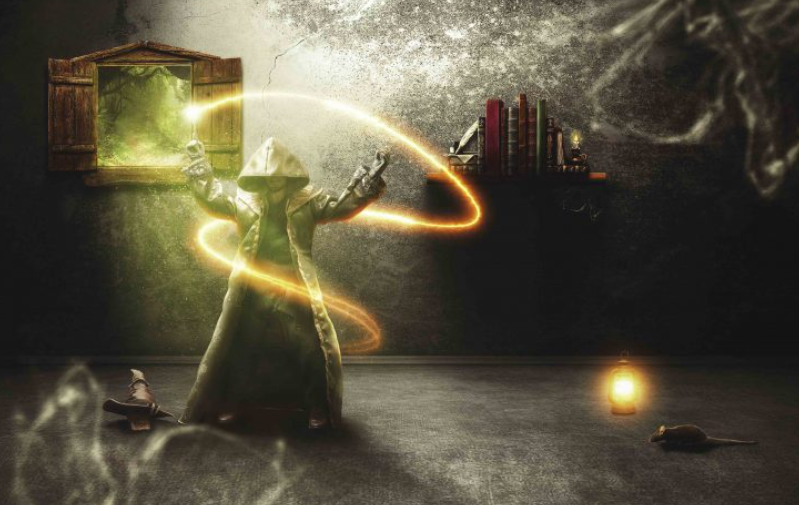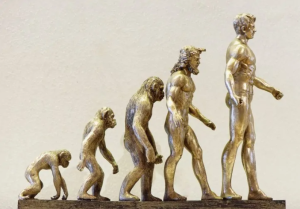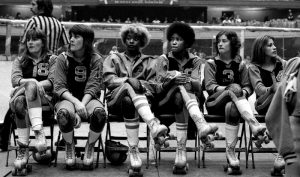Warlock vs Wizard Whats The Difference

An old man with a white beard, wearing a billowing grey cloak, and carrying a wooden staff could be either of the three: a warlock, a wizard, or a hermit. If the old man’s staff can cast spells, then they’re definitely not a wandering hermit. However, there have been references from centuries-old texts about their existence. Warlock vs wizard, what makes them powerful?
Warlocks and wizards are both magic practitioners. They’re both powerful, can summon creatures, and are knowledgeable in the magical arts. Is Merlin based on a real person? Are Nostradamus’ predictions accurate? Is Gandalf the Grey a good wizard? Does Professor Dumbledore’s power still persist after death? This article will explain the difference between a warlock vs a wizard.
A warlock and a wizard are not the same.
First, the warlock, rooted from the Old English word waerloga means “oath breaker.” Second, the wizard, rooted from the Middle English word wysard means “wise.” Each is a distinct type of magic-wielder whose powers depend on either their surroundings or the powers passed on to them.
A warlock is the dark embodiment of magic, while a wizard is seen as good and kind enough to give out advice. Warlocks, on the other hand, are good at deceiving people. Meanwhile, wizards are chosen as allies because they help people achieve their goals.
Wizards are good, warlocks are not.
Like everything else in life, anyone can choose how to use their gifts. But in the magical world, there’s a stereotype. Let this part of the warlock vs wizard debate explain the difference.
Warlocks utilize unholy magic, and they are seen as demonic, egocentric, and avaricious. Their magic doesn’t come from nature and their goal is to become powerful.
On the other hand, wizards are typically portrayed as wise men who advise the highest points of authority regarding ruling matters. Their magic is for the greater good and they get their powers from the Earth.
Both the warlock and wizard work alone most of the time.
This part of warlock vs wizard discusses the possibilities of magic wielders living among men. Like witches in a coven, warlocks and wizards belong in their own magical communities too.
Unlike the witches’ coven, however, there’s no known way to call a group of warlocks or wizards. However, other cultures’ legends believe in their existence.
There’s an island of warlocks in Chile.
Just off the coast of Chile in the Los Lagos region lies the Chiloé Archipelago. Navigator José de Moraleda gave a magic book to machi Chilpilla when he was defeated in a magic competition. After that, the book Levisterio led to the rise of a secret group of people practicing indigenous rituals.
As a result, the secret society called La Recta Provincia (or La Mayoria) was formed, headed by a king and his council. They lived in a cave guarded by the deformed human monster, Imbunche.
Rumor has it that these warlocks use macuñ, a waistcoat with powers, that can make them soar. They also wore small lizards on their bandana that gave them the ability to transform into animals. And instead of a wand, they have magical stones that can cast powerful curses.
Merlin’s existence has been the subject of several debates.
It’s still unclear whether King Arthur and the Knights of the Round Table were based on real people, including the wizard Merlin.
Merlin is a character of the Arthurian legends. They say that he inherited his incubus father’s powers of prophecy and shapeshifting. Moreover, the wizard was based on the Medieval Welsh poem, Myrddin Wyllt, and the Romano-British war leader, Ambrosius Aurelianus.
The wizard played a huge role in the legends. He stands as a “bard, prophet, magician, advisor, and warrior” next to King Arthur. In the Harry Potter universe, however, the wizard is akin to an almighty presence and a figure in history.
Some historical warlocks and wizards are believed to possess magical abilities.
People started believing that these men had powers and magical abilities. Historians relied on accounts and letters of the past to understand whether they’re actually warlocks or wizards.
It was rumored that a Scottish mathematician took part in alchemy.
This mathematician discovered logarithms and made use of the decimal point. John Napier was the 8th Laird of the Merchiston estate. Math, physics, and astronomy were his main interests.
He wrote Mirifici Logarithmorum Canonis Descriptio in 1614, a book that contained explanatory matter and natural logarithms. Three years after, he created a calculating device called Napier’s bones. But in 1593, he considered A Plaine Discovery of the Whole Revelation of St. John as his most important work. It was a book that attempted to predict the date of the Apocalypse, as was written in the Bible‘s Book of Revelation.
People thought he was a warlock with great interest in alchemy and necromancy. In fact, his neighbors even “accused him of being a sorcerer and in league with the devil, believing that all of the time he spent in his study was being used to learn the black art.”
People thought a fictional mage was a real person.
There’s no clear indication whether Abramelin truly existed. The Book of Abramelin revealed that the mage lived from 1362 to 1458. The mage was born in Würzburg, Germany. It was said that the angels taught Abramelin the Mage how to use magic.
It was also claimed that Abramelin the Mage created 2,000 spirit cavalrymen to help elector Frederick of Saxony, assisted the Earl of Warwick to escape jail, and saved Antipope John XXIII from the Council of Constance.
The Book of the Sacred Magic of Abramelin the Mage was the translated work of Samuel Liddell MacGregor Mathers in the 19th and 20th centuries. Unfortunately, historians believe his translation isn’t the most accurate as the manuscript copy used is unclear.
Nostradamus’ predictions were accurate.
Most commonly known as the reputed seer Nostradamus, he wrote several books based on the future he saw. He wrote two books based on his predictions. First, the Almanacs, a list of detailed predictions published annually. Second, the Les Prophéties (The Prophecies), in which the predictions follow no chronological order.
Astrologers heavily criticized Nostradamus’ predictions, mostly because he assumed that “[planetary configurations]… could actually predict what would happen in the future.” But his supporters think otherwise, saying his predictions were subject to interpretations. Some of the predictions claimed to have come true were the Great Fire of London in 1666, the French Revolution, World War I, and World War II.
A mystic man reportedly healed the last emperor of Russia.
Grigori Yefimovich Rasputin grew to be a strange child. He could calm angry animals and point out crime suspects immediately. This led people to believe that he was the devil incarnate.
He spent his youth traveling. Rasputin experienced a religious conversion and decided to enter the monastery. Unfortunately, accounts say he failed to become a monk. As he grew older, he traveled back to Saint Petersburg.
He met Tsar Nicholas II and became a friend to the imperial family. In 1906, he healed the imperial couple’s son Alexei from hemophilia. Afterward, he was considered a mystic, visionary, and prophet. He earned the nickname Strannik, meaning, wanderer or pilgrim.
The rumor between Tsarina Alexandra and Rasputin was excessive and exaggerated. This led to Russian aristocrat Feliz Yusupov plotting the death of the mystic man. Yusupov invited Rasputin over for dinner. The aristocrat became terrified because Rasputin was unaffected after eating poisoned cake and drinking poisoned wine. He finally died after being shot in the forehead.
Warlocks and Wizards have different kinds of magical abilities.
No power is created equal, even if they both possess magical abilities. Though they are hardly distinguishable, this part of warlock vs wizard discusses their similarities and differences. Both practitioners specialize in other forms of magic. Even though it appears boundless, magic is limited.
A warlock practices dark magic.
“Oath-breaker” itself is a dead giveaway. Warlock is a term given to men breaking their baptismal vows and betraying their Christian faith to pursue dark magic. They are usually imagined as male witches, but nothing could be further from the truth.
Occultism is defined as “a category of supernatural beliefs and practices which generally fall outside the scope of religion and science.” It is believed that warlocks practice magic that falls under this category, such as alchemy and divination.
Generally, warlocks specialize in dark magic. Above all, they can conjure spirits, reverse spells, and speed up time.
Wizards get their magic from the earth.
Contrary to popular belief, a wizard is neither evil nor do they worship the devil. Such as the names they go by, like blessers, sorcerers, cunning-man, and wise-man, the wizard is the true male equivalent of a witch. Like their female counterpart, they practice witchcraft.
Their magic is grounded on earth, nature, science, and medical arts. They can also cast spells, translate ancient runes, recite incantations, and perform rituals. The application of herbs, amulets, and potions are all associated with their healing powers.
There are magical items that they both use.
Most humans need tools to make their lives easier, whether they can do magic or not. This is the part in warlock vs wizard wherein both parties agree. There is always a need to perform a specific type of magic using the right tools.
The wand is an extension of the conjurer’s arm.
Remember the spell “Wingardium Leviosa”? That Harry Potter scene perfectly captured why magic practitioners need to use a wand. It centralizes magic to accurately perform spells. The wand helps the caster focus on concentration.
It’s usually made of wood, sometimes depending on the user’s birth tree. Some wands are passed down from one generation to another. Both a warlock and a wizard can use a wand.
The staff is more than just a guiding stick.
The wizard Gandalf is never without his staff in every Lord of the Rings scene he’s in. In fact, the wand and the staff are similar: both are made of wood and can be used to cast a spell. Though some claim the staff is a tool most warlocks use.
They are never without a magic book.
Proper education and guidance are the keys. This is true even with magic practitioners. Both warlock and wizard are never without a magic book of their own. This book is like a cross between an encyclopedia and a school book. It offers magic spells for every type of situation, but it can also help make its user stronger.
Familiars are not pets.
They are neither pets nor animal companions. Familiars are “supernatural entities that would assist [a witch/wizard/warlock]… in their practice of magic.” They are sometimes called alter ego, doppelgänger, personal demon, personal totem, and spiritual companion.
It could be any type of animal, but some have owls, dogs, or wolves. The most common choice for a familiar is a cat. Thus, the reason why black cats are unpopular is because of alleged witches keeping one.
Magic practitioners aren’t just witches, wizards, and warlocks.
In fact, there are several others who practice different types of magic altogether. Some specialize in a more specific type of magic more than others, but that doesn’t mean they’re any less.
Alchemist
Part experiment and part magic, alchemy is the ancient study of chemistry and philosophy. It came from the word kimia, referring to the Egyptian way of preparing the stone or elixir. The study dates back to Ancient Egypt and followed the practices of Greek philosophy.
There are three goals an alchemist aims to discover: the Stone of Knowledge, the Fountain of Eternal Youth and Health, and turning metal into gold. They are like a cross between a warlock and a wizard, mainly because alchemists use science to prove a theory, but for personal gain.
Chemical Heritage Foundation found English mathematician Isaac Newton’s manuscript detailing how to make “philosophic” mercury, which is one of the ways in making the philosopher’s stone.
Elementalist
Water, Earth, Fire, Air. No, it’s not the Avatar: The Last Airbender introduction. Though, it’s considerable since an Elementalist can control any (not all) of the four elements. Some consider Elementalist to be wizards, respectively.
But elemental magic is a big umbrella since each element has a group of sub-elements. For example, in a group of water elementals, some may be able to control ice. It’s also applicable in other elements.
They are nothing like Greek mythology’s elementals, however, which are mythical creatures that act like nature’s guardians. The four categories are gnomes (earth), undines (water), sylphs (air), and salamanders (fire).
Exorcist
Exorcism is driving out evil spirits and demons. On the other hand, the one who can do this act of purification is called an exorcist. They can be a priest, nun, monk, witch doctor, shaman, psychic, or geomancer.
To Catholics, an exorcist is “a cleric… or a priest who has been mandated to perform the rite of solemn exorcism.” These clerics or priests may be ordained by the Minor Order of Exorcists. As per the 1917 Code of Canon Law, a local bishop can authorize solemn exorcism to “a person believed to be possessed.”
Prophet or Seer
A prophet is a middle man between gods and humanity. Contact with a divine being is a way to deliver messages. Meanwhile, prophecy is rooted in the Ancient Greek words pro (in advance) and phesein (to tell). Prophets have existed in Abrahamic religions including Judaism, Christianity, and Islam.
The prophet’s magical equivalent is the seer. A seer can see the future, while a prophet is handed information about the future through a dream.
Shaman
Shamanism came from the Tungusic word šaman, meaning “one who knows.” It also refers to “anybody who contacts a spirit world while in an altered state of consciousness.” They are sometimes called oracles, sorcerers, or medicine men or women.
To simplify, a shaman is a spiritual leader and a traditional healer. They can cure the sick, whether physically or mentally. They also have the ability to guide lost souls in purgatory get to the light after a sudden death.
Representation of Warlocks and Wizards in Pop Culture and Modern Media
The Lord of the Rings Trilogy’s Gandalf the Grey
Definitely the most prominent wizard in the fictional world, Gandalf the Grey is one of the main characters in J.R.R. Tolkien’s works, The Hobbit and The Lord of the Rings. He is a powerful wizard who helps guide the ones who bear the Ring of Power.
Tolkien said that Gandalf appeared as an aged, grey-haired wizard clad in grey clothes. He harnesses his power using his staff. Even though he is a powerful wizard with fire powers, he is better at encouraging other characters. He worked alongside hobbits of the Shire and the dwarves of Middle-Earth.
The Wizard of Oz
He’s not the main character even though he’s in the title. It was 1900 when American author Lyman Frank Baum published The Wonderful Wizard of Oz. The book follows Dorothy Gale and her dog Toto on their quest to find a way out of the Land of Oz.
The Wizard’s full name is Oscar Zoroaster Phadrig Isaac Norman Henkle Emmanuel Ambroise Diggs. He’s either a shapeshifting wizard or an illusionist. He even transformed into a giant head, a beautiful fairy, and a monster.
He was a disembodied voice and remained mostly unseen throughout the book. It wasn’t until Dorothy, Scarecrow, Tin Woodman, and the Cowardly Lion discovered his secret. The wizard was actually “an ordinary conman… using elaborate magic tricks and props to make himself seem ‘great and powerful.’”
DC Comics’ Wizard
Even though he’s not as popular as Batman or Superman, he still made a name for himself in the first season of The CW Network series Stargirl.
In the comics, William Asmodeus Zard was a gunman for hire. In order to specialize in kingpin, he moved to Tibet to study the mystic arts of illusion and deception. Zard believed the Justice Society of America (JSA) was a cover-up for a criminal organization. With the initials, W.I. Zard, he offered a million dollars to join them.
Meanwhile, in the 2020 series Stargirl, American actor Joe Knezevich played the role of Blue Valley councilman and magician William Zarick. He’s a member of the Injustice Society of America (ISA) under the alias Wizard.
Marvel Comics’ Warlock
He first appeared in the Marvel Comics series The New Mutants in 1982. Technarchy belongs to the shapeshifting alien race that feeds on a sentient being’s “lifeglow.” And as a member of Warlock, he is a mutant of his own race. He was the only one who possessed “a distinctive degree of compassion.”
Warlock became a member of the New Mutants and became best friends with Cypher. Even though he’s compassionate, he has a hard time telling whether a creature is sentient or not. It was up to New Mutants leader, Danielle Moonstar, to give Warlock permission. The supervillain, Cameron Hodge, killed the Warlock in an attempt to steal his powers.
BBC One’s The Adventures of Merlin
This British fantasy-adventure drama by the BBC ran from 2008 to 2012. The Adventures of Merlin is a loosely-based adaptation of the Arthurian legends. Northern Irish actor, Colin Morgan, played the titular role.
Future king Arthur Pendragon (portrayed by English actor Bradley James) hoped that magic will return to Camelot on his reign. The young wizard Merlin became Arthur’s retainer after he informed the future king about his destiny. They became good friends and comrades as the series progressed, reaching up to five seasons.
Sabrina the Teenage Witch’s Salem
In 1996, the American sitcom Sabrina the Teenage Witch premiered on ABC. It follows the adventures of 16-year-old witch Sabrina Spellman in high school.
Her witch aunts Hilda and Zelda keep a black cat named Salem. It wasn’t until Sabrina realized she was a witch that she heard Salem talk! Unfortunately, Salem used to be a 500-year-old megalomaniacal warlock whose ultimate goal was world domination. He was punished to spend 100 years as a cat.
He has the personality of a normal cat: a sassy troublemaker. Though he used to be evil, he served as Sabrina’s magic mentor and guided her to the right path, no matter how sarcastic.
Marvel Cinematic Universe’s Doctor Strange
British actor, Benedict Cumberbatch, had been playing the role of Doctor Strange since 2016. He’s based on the character of the same name created by legendary comic book artist Stan Lee and co-creator Steve Ditko.
Stephen Strange was a man of science and a renowned neurosurgeon before he met a car crash that shattered his hands. As he was wandering the streets of Nepal, the sorcerer Mordo took him to Kamar-Taj. As he was recovering, the Ancient One became his mentor as he masters the mystic arts.
In Infinity War, the Titan alien Thanos killed Doctor Strange as he forcefully took the Time Stone from his neck. But he returned in the final installment, opening every portal to every Avengers superhero who can fight the Titan.
Harry Potter Series’ Professor Dumbledore
The Wizarding World would have ended long ago if it weren’t for one Hogwarts Headmaster. Professor Albus Percival Wulfric Brian Dumbledore (or just Professor Dumbledore) is the most powerful wizard in the Harry Potter series. There were four actors who took on the role. First, English actor Toby Regbo when he was young. Second, English actor Jude Law when he was a Hogwarts professor. Third, Irish actor Richard Harris on the first two HP films. And lastly, Irish-English actor Michael Gambon on the succeeding.
Professor Dumbledore was born to a wizard father and a Muggle-born witch mother. He has two younger siblings, Aberforth and Ariana. He was a Defence Against Dark Arts professor in the Fantastic Beasts franchise. One of his titles was the Chief Warlock of Wizengamot, the predated high court of law and parliament in wizarding Britain. In the series’ context, warlock means a high-ranking wizard.
However, for decades, he had been Hogwarts Headmaster. Dumbledore stood as a father figure, guardian, and mentor to the young Harry Potter. He was a good man until his death. It was a way of freeing Potions Master Severus Snape from the Unbreakable Vow and inciting the beginning of the Second Wizarding War.
Dungeons and Dragons’ Wizard class
The fantasy tabletop role-playing game Dungeons & Dragons have been around since 1974. Since then, the game grew and has expanded throughout the decades. It’s an interesting game, using only a book, pen, paper, polyhedral dice, and a wide imagination.
Wizard is one of the many character classes. Though weak and vulnerable, a Wizard can cast powerful spells. Meanwhile, a Wizard can have specific powers, depending on which of the eight schools of magic he belongs. There’s abjuration, conjuration, divination, enchantment, evocation, illusion, necromancy, and transmutation.
Realtime Associates’ Warlock Video Game
In 1995, game developers, Realtime Associates, created Warlock. It’s an action-type, single-player video game based on the 1989 American supernatural horror film of the same name. The game follows a modern druid trying to stop the Warlock. The Evil One put his only son, the Warlock, on a quest to find six ancient runestones. These runestones are powerful enough “to undo the Earth’s creation.”






